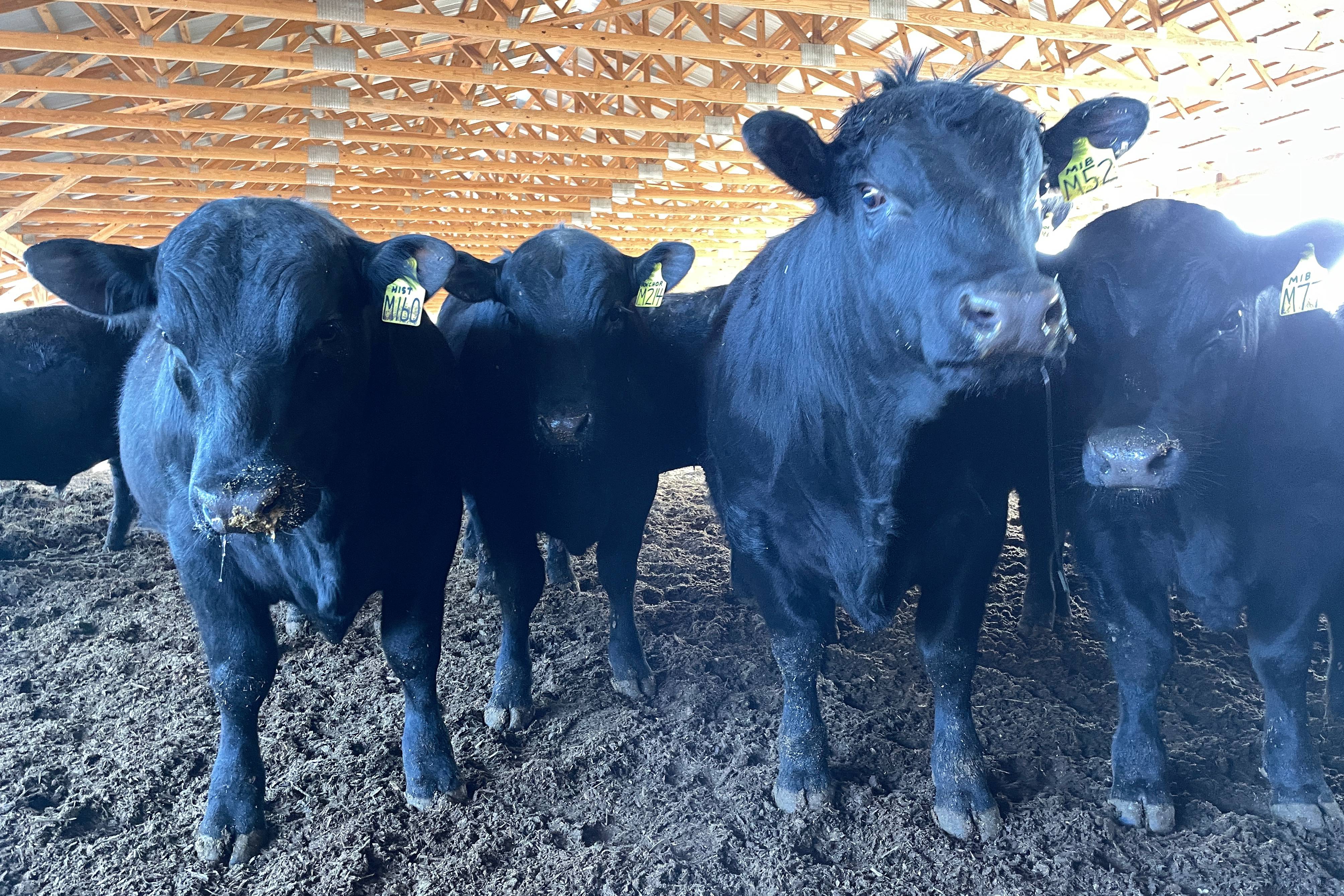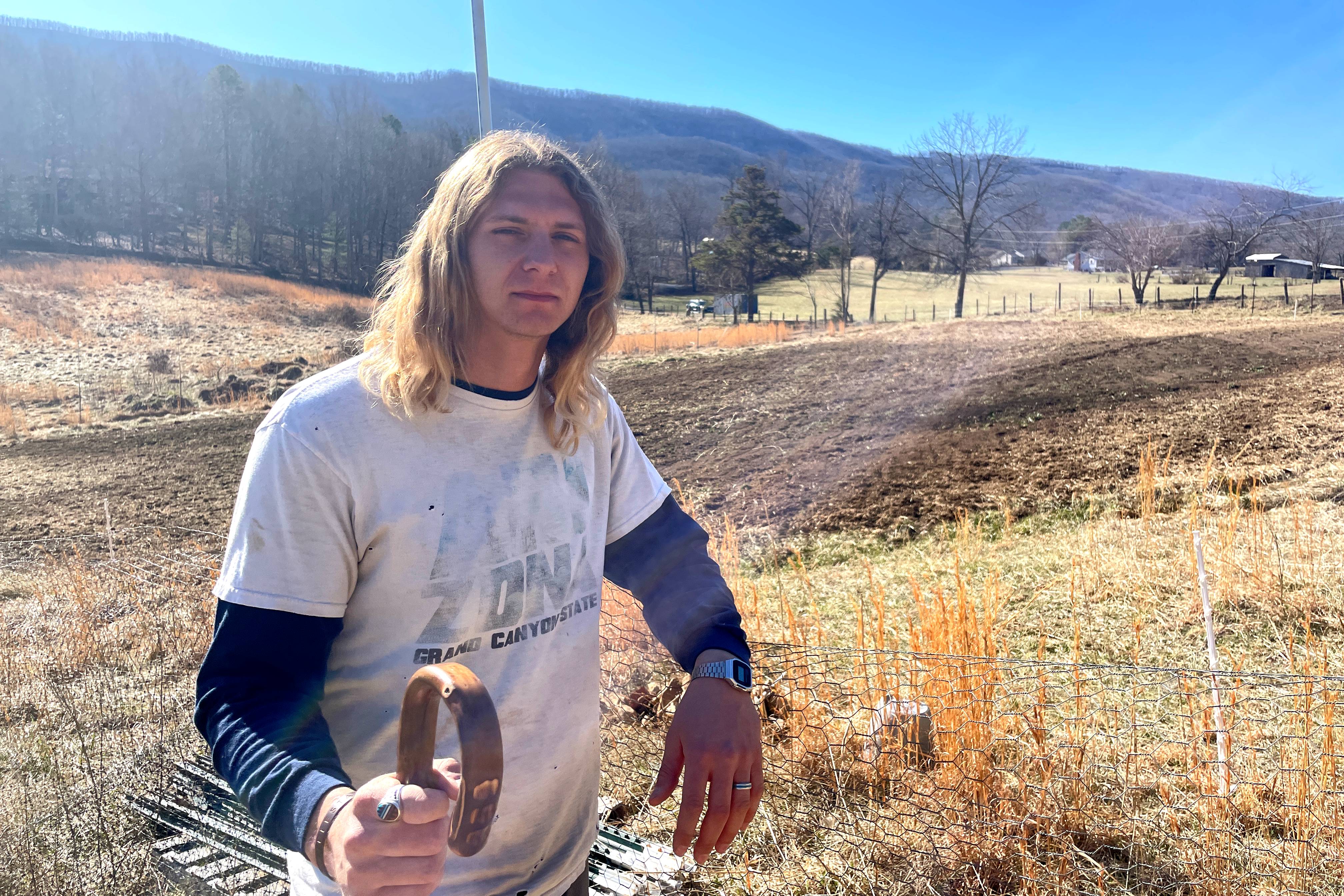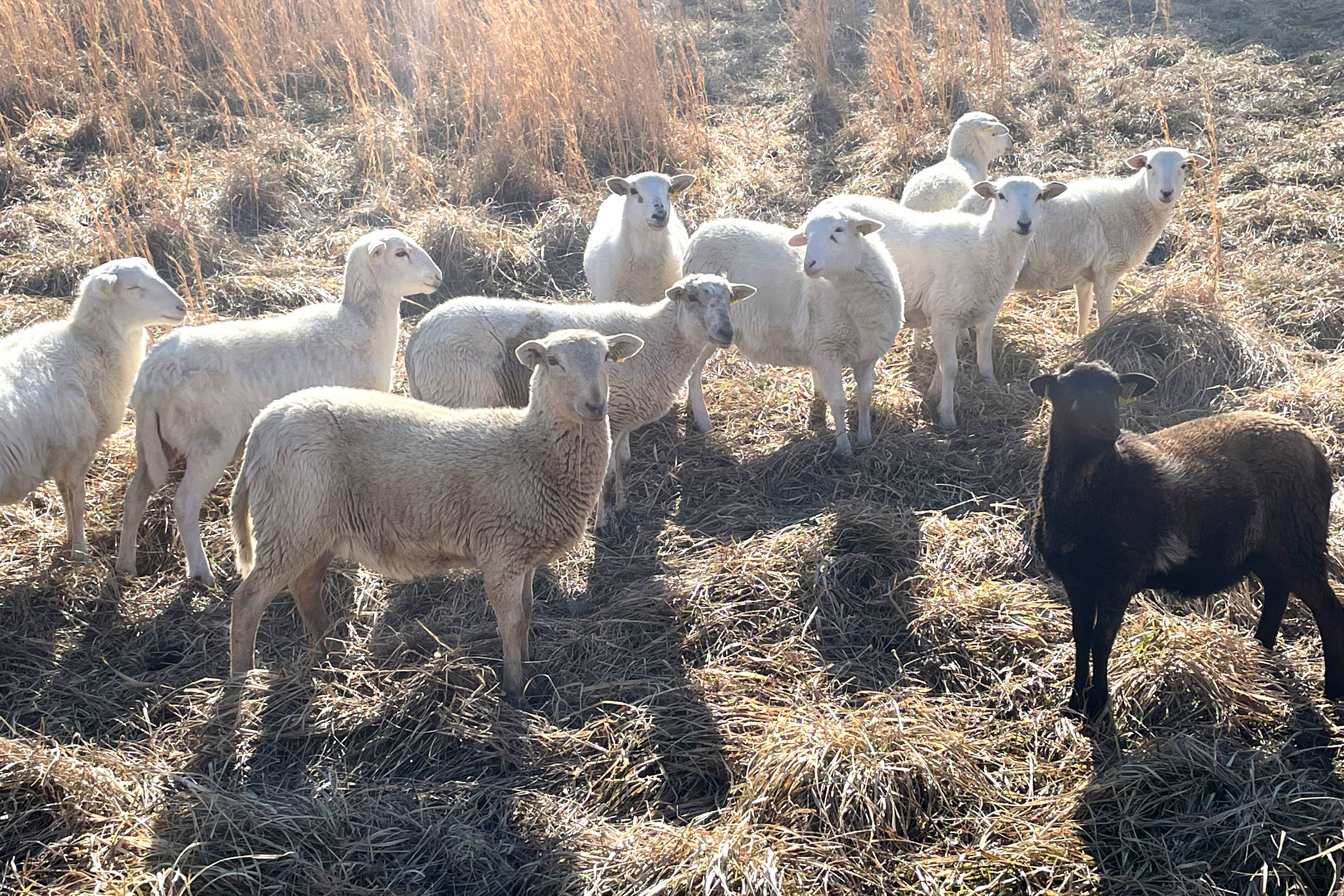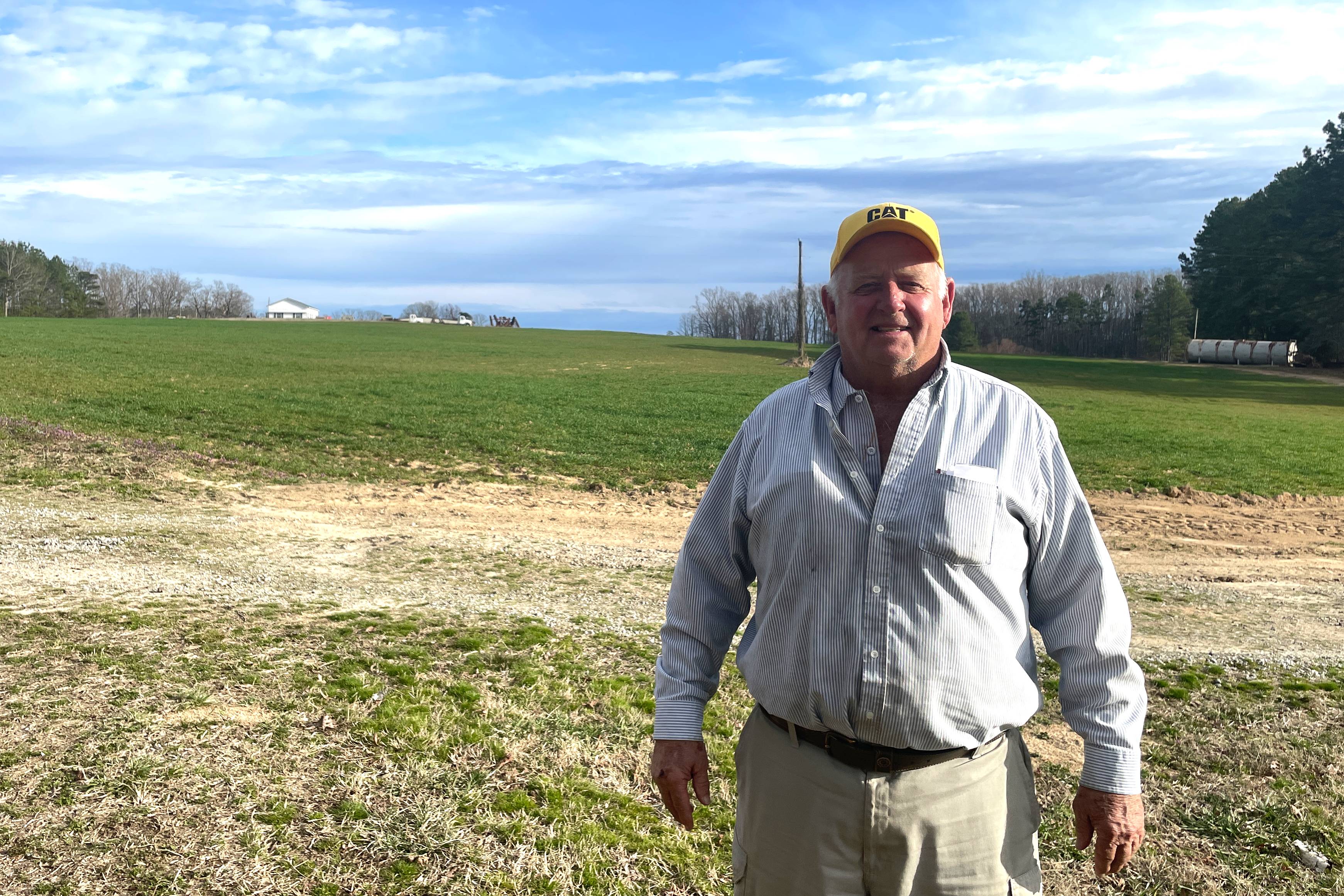Dalton Bennett was in sixth grade, and there was a calf about to be born, but Bennett’s father had recently broken his arm in a car crash, and, well, somebody had to step up.
“Put that glove on and I’m going to tell you what to do,” his father said.
Sitting in the driver’s seat of his Polaris Ranger utility vehicle on a recent February morning, watching cattle mill around on his family’s Campbell County farm, the 33-year-old Bennett grinned as he recalled that day.
“It was just me and him. There wasn’t anybody else there — ‘Here’s what we’re gonna do, son.’”
“We worked it out and got a live calf. Still to this day, as soon as any time we have to help a cow calve, I put the glove on. I learned when I was young,” Bennett said. 
Bennett told the story as an example of what it’s like growing up on a family farm. He’s a fourth-generation farmer at Knoll Crest Farm, which traces its roots to 1929 and where the Bennetts have been specializing in bulls and cows since the 1940s.
Sometimes he learned basic things along the way, like how to drive a tractor. Sometimes, in the case of helping deliver the calf, he was “thrown into things.”
“You’ll never be ready if you wait ’til you’re ready,” he said.
Farming is a way of life for tens of thousands of Virginians. Agriculture is the commonwealth’s largest private industry, with state officials estimating an annual economic impact of more than $80 billion. The related industry of forestry comes in third place.
There are about 39,000 farms in Virginia. That’s a figure that’s held steady since 2022, according to annual federal surveys; before then, it was on the decline for years. A decade ago, there were 45,000 farms. Farmers and experts point to a variety of reasons for the gradual decrease.
Farmers, on average, are getting older, and often, there is no next generation that wants to take the reins. Meanwhile, land and production expenses are rising, creating barriers to entry for new farmers who often must choose whether to start small or take on significant debt.
Numbers tell only part of the story
Some farms, like the Bennett family’s, have been around for decades, with each generation passing land and knowledge to the next.
Other farmers are just starting out today, learning the ropes and navigating the economic math of land prices, planting schedules and all of the other details that ultimately put food on tables.
Seth Davis, 29, of Botetourt County has about a half-acre of vegetables, 10 sheep and a dream to turn his side gig of farming into a full-time venture. He’s been working on it since the beginning of last year and has one season at the local farmers market under his belt already.
“You could practically call this a hobby farm at the moment, but I don’t want it to end that way,” Davis said.
Some farmers have been in the business for decades. They’ve seen good years and bad.
Bill Devin, 74, started his own tobacco farm nearly 50 years ago in Charlotte County after growing up learning the business from his father. He said his career has “been a blessing.”
“You know, the main thing is when you get up in the morning, you want to go to work and be happy, and you want to be happy doing what you do,” Devin said. “And if you can’t be happy in that, it’s not beneficial to you. It’s not beneficial to the farm.”
Bennett and Davis are atypical in that each is more than a quarter-century younger than the average age of a Virginia farmer, which is about 59.
Farming is a profession that skews older, in part because many are reluctant to stop working and in part because there are fewer younger farmers waiting in the wings to replace them.
“You’ll have a scenario where in many cases, the farmer actually passes away because a lot of farmers don’t choose to retire. Some do, but a lot don’t,” said Dixie Dalton, an associate professor and director of the Center for Economic Education at Virginia Tech.
“And then when that farmer passes away and there’s not a next generation that wants to take over that farm, then those heirs have to determine what to do with that farmland.”
Some of those properties are bought up by adjacent landowners, including other farmers. Others are sold to residential and commercial developers to build houses, shopping centers or solar power plants, among other things.
These new uses for a property often spell the end of the line for its use as a farm.
“Once we see farmland revert to another use, you don’t often see it come back into production,” Dalton said.
Other challenges farmers face include increasing farm production expenses, such as equipment, crop inputs, livestock, animal feed and labor, according to the Virginia Farm Bureau Federation.
Although the number of farms is decreasing, agricultural output is increasing, thanks in large part to efficiencies and advances in agricultural science.
Between 2017 and 2022, when the number of Virginia farms decreased by 10%, sales of products sourced from Virginia farms grew from about $4 billion to about $5.5 billion.
Furthermore, the variety of agricultural jobs is growing. More than 300 careers are now considered agricultural, said Andy Seibel of the Virginia FFA, the organization commonly known as Future Farmers of America that provides leadership skills for students in grades seven through 12.
Students today can pursue careers in biotechnology, veterinary science, sports turf management and a variety of other fields, Seibel said.
“The careers that these kids are going to have the opportunity for are endless. It’s just trying to make sure that everybody understands that that’s still a component of agriculture,” Seibel said.
Old skills, new science breed success in Campbell County

For Bennett, the appeal of a career in farming is “seeing successful things take place.”
Knoll Crest Farm takes a scientific approach to raising cattle, using DNA testing, selective breeding and other techniques to favor certain traits.
Creating a plan to increase certain traits or decrease others in the cattle, and seeing it come to fruition in the form of a calf that has those traits — “That’s success,” he said.
Bennett also grows some row crops like corn and soybeans. Like Devin, he said that farming is a combination of good and bad days.
“There’s days that you go out and you’re like, man, it rained last night and the corn looks awesome and I love looking at that. Or it’s finally dried out and the calves are clean and they’re feeling good and running across the pasture and they’re healthy. And you say, ‘Man, I love that part of the job,’” he said.
On the other hand: “There’s days that you just get up and it’s 36 degrees and it’s raining, you know, like I have to go outside and work today; I don’t really want to.
“I tell people all the time, you’re going to have a bad day no matter what you do. You pick rainbows for a living, there’s going be a day like, I don’t want to pick that rainbow, you know. I try not to have too many bad days.”
Bennett and his wife, Monica, are raising three daughters. He sees value in his children growing up on a farm, regardless of whether they choose to follow in his footsteps.
“Let’s say a kid grows up on a farm and they decide they don’t want to farm, but they want to operate heavy machinery,” he said. “Well, they have a basis of equipment operation.
“Let’s say they want to go into logging. They already know how to run a chainsaw. Say they want to go in the business world. They’ve probably already balanced the checkbook and understand, they’ve managed a 4H project and they understand that you put this in, get this out, that’s profit. There’s a lot of underlying skills.”
Bennett described a day this past summer when he told his daughters they were going to farm that day.
One daughter, age 4, replied that it would be fine for her sister but that she herself was “‘going to do something important,’” Bennett recalled.
“‘I said, ‘What do you mean? This is important,’” Bennett said. “And we talked about it. I said, ‘Baby, we grow food.’”
“I think a lot of people have that idea: ‘Why don’t you do something important?’ I can’t think of many things that are a whole lot more important than three meals a day.”
Botetourt County farmer builds from the ground up

For many farmers, agriculture isn’t a full-time job. Seth Davis is among thousands in Virginia who rely on other income alongside their operations.
Davis started Shepherd Sky Farm at his Botetourt County home in January 2024.
After working a full-time day job in HVAC for Altavista-based Moore’s Electrical & Mechanical, he comes home and works on his land.
He has 10 ewes in a pasture next to about a half-acre of tilled land.
In all, his property in the county’s Buchanan area spans about 21 acres, but only 10 can be farmed thanks to the surrounding mountains.
Davis doesn’t mind. He grew up in northern Alabama, which, like Southwest Virginia, enjoys mountain views.
He spent a year and a half working on a farm in the relatively flat region of Durham, North Carolina, before moving to Virginia to set up his own place. He sought out mountains as he shopped for land. 
Now he has a list of 39 fruits and vegetables to grow: lettuce, peppers, radishes, squash, tomatoes and so on.
His dream is bigger than that half-acre and that field with fewer than a dozen sheep.
“If life would allow me, I wouldn’t mind having however many acres that I could, because I know how to work it, and I would be doing a good job at it, but I’m not greedy either,” Davis said.
Davis said he enjoys working outdoors, and he’d like to join the ranks of full-time farmers.
“I just love God’s creation and being around nature,” Davis said. “I find it an honor to take stewardship over the land that I’ve been granted to look over while here on Earth, and it’s a responsibility that I not only maintain the land, but improve it the best I can.”
He’s inspired by his research into regenerative agriculture, a style of resource management that aims to reduce the environmental impact of farming by practices such as rotating crops frequently and moving grazing animals around more often.
Davis said he has “watched the rewarding results in healthy food being produced without chemicals of any kind, soil health improving, and in turn having the ability to feed more people from the same amount of land.”
“The world would be a little bit better if we had better relationships and were doing business with our local communities first and foremost,” he said.
But getting things going has been challenging. It’s expensive, and it takes not just nearly all of his time but also nearly all of his money.
“It’s just like any other business that you’re going to start,” he said. “You have to put money into it to be able to get money out of it.”
“On the same note, I’ve put practically everything I have into it and hardly made anything back yet, which is very daunting,” he added.
He’s learned a number of lessons about budgeting, buying only what you need and saving money by building and fixing things himself.
Afternoons and evenings pursuing his dream come after an already full day of HVAC work. Sometimes he farms at night by the light of a headlamp.
His wife of six years, Skylar, is “very supportive,” Davis said, but he knows it’s hard on her because they can’t spend as much time together as they otherwise could. They used to go backpacking together “constantly,” but those trips have become less frequent as the farm has required more of his time, he said.
Building a customer base is difficult, too. Last year, Davis set up shop at the Botetourt Farmers Market — asked about his success there, he replied simply, “It was OK” — but he hopes for more business this season.
He’s considering selling to local stores or starting up a CSA — for community supported agriculture — which is essentially when customers pay a farmer early and receive a share of the produce after it’s harvested, like a subscription.
Davis said he’s had “an intruding thought” of calling it quits, but this is his passion.
“It’s what I want to be doing, and I just can’t give up,” he said.
Charlotte County farmer’s advice: Take ‘steady steps’

In the early 1980s, when Willie Nelson was helping start up a benefit concert to assist beleaguered farmers, Bill Devin was farming tobacco in Charlotte County with a single John Deere tractor and a 1969 three-speed Chevrolet pickup truck.
Devin had struck out on his own a few years before, in 1977, after growing up learning the business from his father.
“All those years working with my dad, I made mental notes — ‘Dad, I could do this a whole lot better,’ and a lot of times it would be, ‘Dad, you had a better idea than I do,’ but that’s the way it was,” Devin said. “I remember the good things that he did and I incorporated the other good things that I thought were good.”
He bought another farm in 1980. By that time, he was growing 30 or 40 acres of tobacco.
Then, agriculture across the U.S. was hit by a major economic downturn that today is known as the 1980s farm crisis.
Land prices fell, interest rates soared and many farms around the country went bankrupt.
“It was a long time before I bought anything else,” Devin said. “I was struggling to keep my head above water.”
His banker asked him what his plan was to get his debt down to a manageable level. Fortunately, Devin had a plan.
He sold off several newer tractors, a Toyota pickup truck, a grain truck and most of the rest of his equipment. He sold timber from his land.
He bought that one John Deere tractor, used, and hunkered down.
There are few times in his life, Devin said, when he’s really been scared. This was one of them.
He owed money. Interest rates were sky-high. He was losing sleep at night.
“It’s an old saying: Hard work won’t hurt you, but worry will kill you,” Devin said.
But he kept going.
“I farmed with that tractor for two or three or four years. And things started getting better,” he said.
In 1982, President Ronald Reagan called farmers “real miracle workers of the modern world” and said that they were “making something look easy that would be considered a miracle almost anywhere else in the world.”
In 1985, Willie Nelson, Neil Young and John Mellencamp held the first Farm Aid concert to raise money and awareness about what farmers were going through.
Devin kept farming.
Eventually, the crisis passed. He bought more equipment and more land.
Today, Devin has about 4,000 acres.
He grows corn, wheat and soybeans on about 2,000 of those acres.
In 2022, he retired from growing tobacco, turning that part of the operation over to his son-in-law, hoping to take things a little bit more easily.
“I thought at my age, doing it for 47 years, I needed to slow down just a little and not quite do so much,” Devin said.
Some of his land is in a conservation easement.
Some of it has been sold or will be leased, along with land owned by other family members, to help create the 800-megawatt Randolph Solar power facility, which Dominion Energy estimates will start coming online in phases in 2030.
“The solar will bring in more income for me than any crop that I can plant,” Devin said.
[Disclosure: Dominion is one of our donors, but donors have no say in news decisions; see our policy.]
Today, Devin has a veritable fleet of trucks and tractors for his thousands of acres. He’s come a long way from the days of that one Chevy and that one John Deere.
“It’s a lot of hard work … it doesn’t count how fast you go up the ladder, but you take steady steps. Steady steps,” Devin said. “Don’t you fall off the ladder.”
* * *
It’s early May, and the three farmers are keeping busy.
After a successful bull sale in April, Dalton Bennett is working on breeding Knoll Crest Farm’s spring calvers — the cows that will give birth next spring.
About one-third of the farm’s 800 cows are spring calvers, while the rest will give birth in the fall.
The farm is also making hay to help get the herd through the winter.
For Seth Davis, the warmer weather means that work at his commercial HVAC job is picking up.
But at Shepherd Sky Farm, lambing season is underway, and in addition to working on his vegetables, Davis will be tagging, banding and bottle-feeding lambs as needed.
Bill Devin has been bringing new land into cultivation to replace the acres that will be used for solar power generation.
He’ll plant wheat there first, and then rotate to either soybeans or corn down the road.
Elsewhere on his farm, his crew has begun planting about 80 acres of tobacco and will move on to about 300 acres of corn next.
With all of that, and another approximately 1,500 acres of soybeans, he expects to stay busy well into the summer.
This reporting is part of a collaboration between the Institute for Nonprofit News’ Rural News Network and Canary Media, South Dakota News Watch, Cardinal News, The Mendocino Voice and The Maine Monitor. Data visualizations from Big Local News at Stanford University. Support from Ascendium Education Group made the project possible.



